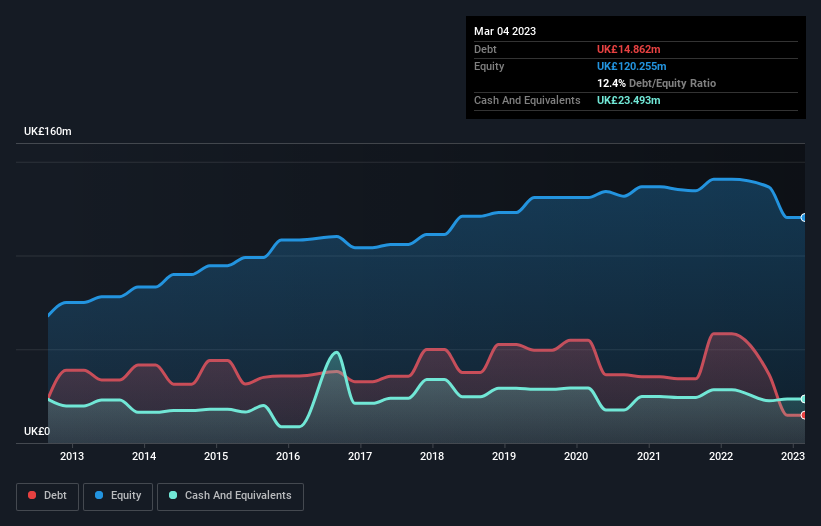- United Kingdom
- /
- Food
- /
- LSE:CARR
These 4 Measures Indicate That Carr's Group (LON:CARR) Is Using Debt Reasonably Well

Legendary fund manager Li Lu (who Charlie Munger backed) once said, 'The biggest investment risk is not the volatility of prices, but whether you will suffer a permanent loss of capital.' When we think about how risky a company is, we always like to look at its use of debt, since debt overload can lead to ruin. We can see that Carr's Group plc (LON:CARR) does use debt in its business. But should shareholders be worried about its use of debt?
Why Does Debt Bring Risk?
Debt assists a business until the business has trouble paying it off, either with new capital or with free cash flow. Ultimately, if the company can't fulfill its legal obligations to repay debt, shareholders could walk away with nothing. While that is not too common, we often do see indebted companies permanently diluting shareholders because lenders force them to raise capital at a distressed price. Of course, debt can be an important tool in businesses, particularly capital heavy businesses. When we examine debt levels, we first consider both cash and debt levels, together.
View our latest analysis for Carr's Group
What Is Carr's Group's Net Debt?
You can click the graphic below for the historical numbers, but it shows that Carr's Group had UK£14.9m of debt in March 2023, down from UK£58.3m, one year before. However, its balance sheet shows it holds UK£23.5m in cash, so it actually has UK£8.63m net cash.

How Healthy Is Carr's Group's Balance Sheet?
The latest balance sheet data shows that Carr's Group had liabilities of UK£32.8m due within a year, and liabilities of UK£15.9m falling due after that. Offsetting these obligations, it had cash of UK£23.5m as well as receivables valued at UK£37.8m due within 12 months. So it can boast UK£12.5m more liquid assets than total liabilities.
This short term liquidity is a sign that Carr's Group could probably pay off its debt with ease, as its balance sheet is far from stretched. Simply put, the fact that Carr's Group has more cash than debt is arguably a good indication that it can manage its debt safely.
Importantly, Carr's Group's EBIT fell a jaw-dropping 56% in the last twelve months. If that decline continues then paying off debt will be harder than selling foie gras at a vegan convention. There's no doubt that we learn most about debt from the balance sheet. But ultimately the future profitability of the business will decide if Carr's Group can strengthen its balance sheet over time. So if you want to see what the professionals think, you might find this free report on analyst profit forecasts to be interesting.
Finally, while the tax-man may adore accounting profits, lenders only accept cold hard cash. Carr's Group may have net cash on the balance sheet, but it is still interesting to look at how well the business converts its earnings before interest and tax (EBIT) to free cash flow, because that will influence both its need for, and its capacity to manage debt. During the last three years, Carr's Group produced sturdy free cash flow equating to 69% of its EBIT, about what we'd expect. This free cash flow puts the company in a good position to pay down debt, when appropriate.
Summing Up
While it is always sensible to investigate a company's debt, in this case Carr's Group has UK£8.63m in net cash and a decent-looking balance sheet. The cherry on top was that in converted 69% of that EBIT to free cash flow, bringing in UK£7.1m. So we are not troubled with Carr's Group's debt use. The balance sheet is clearly the area to focus on when you are analysing debt. But ultimately, every company can contain risks that exist outside of the balance sheet. Case in point: We've spotted 1 warning sign for Carr's Group you should be aware of.
If, after all that, you're more interested in a fast growing company with a rock-solid balance sheet, then check out our list of net cash growth stocks without delay.
New: AI Stock Screener & Alerts
Our new AI Stock Screener scans the market every day to uncover opportunities.
• Dividend Powerhouses (3%+ Yield)
• Undervalued Small Caps with Insider Buying
• High growth Tech and AI Companies
Or build your own from over 50 metrics.
Have feedback on this article? Concerned about the content? Get in touch with us directly. Alternatively, email editorial-team (at) simplywallst.com.
This article by Simply Wall St is general in nature. We provide commentary based on historical data and analyst forecasts only using an unbiased methodology and our articles are not intended to be financial advice. It does not constitute a recommendation to buy or sell any stock, and does not take account of your objectives, or your financial situation. We aim to bring you long-term focused analysis driven by fundamental data. Note that our analysis may not factor in the latest price-sensitive company announcements or qualitative material. Simply Wall St has no position in any stocks mentioned.
About LSE:CARR
Carr's Group
Engages in the agriculture business in the United Kingdom and internationally.
Excellent balance sheet with reasonable growth potential.
Market Insights
Community Narratives




